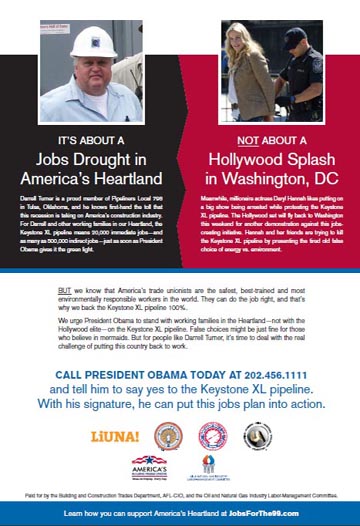As thousands get ready for a big last push on President Obama against the XL Pipeline in Washington DC this weekend, decision makers should remember Elvis Presley’s sage advice: “When things go wrong, don’t go with them.” If, or when, XL goes down, how many politicians, businessmen and labour leaders will get pulled under with it?
By any measure, TransCanada Pipeline’s Keystone XL project has gone horribly wrong. This $7 Billion project was supposed to have been under construction seven months ago. It has yet to receive critical US state approvals, and the once expected pro-forma approval from the White House is now very much in question.
As thousands surround the White House on Nov. 6 to up the pressure on Obama, the Nebraska State legislature is pressing ahead with legislation to force a rerouting of the pipeline around an ecologically sensitive grass lands and the Ogallala aquifer. The Nebraska decision would effectively delay construction by two or more years.
In corporate offices they must be asking how this project has become Canada’s hound dog that can’t catch a rabbit, and has fewer friends every day. Its hard to have sympathy for TCPL, the pipeline builder, and oil companies like Exxon that want to fill up the pipe with raw bitumen. They rejected all criticism of the development model and estimated that the billions of dollars at play would run over top of the opposition. Instead of addressing the economic and environmental concerns, TCPL hired Hillary Clinton’s presidential campaign manager as their chief lobbyist, throwing into question the legitimacy of the US State Department’s environmental review.
But as culpable as the industry is, the fundamental responsibility for this mess lies at the door of Steven Harper and the “sympathetic administration” of the oil industry by the National Energy Board of Canada. While the U.S. debate and regulatory process over XL dealt with jobs and environment, neither were given any serious attention by Canada’s federal government or the NEB. The development model was flawed from the outset and given approval without due diligence.
XL’s proponents might have named it XXL, as in extra, extra large. No one should be surprised that there is such massive opposition to a one million barrel per day export pipeline traversing the entire continent.In Canada, it is driving a doubling of production in ten years, rendering virtually impossible any meaningful greenhouse gas target. Its volume of bitumen exports will make an expansion of upgrading and refining in Canada a remote prospect. In the US it has come to symbolize unsustainable development, over and above its route through eight US States and the country’s largest aquifer.
No doubt there are already business and political consequences for the investors and politicians caught up in these miscalculations. Unfortunately there are also labour leaders caught in the morass.
U.S. construction unions have purchased large newspaper ads attacking the demonstrators that will converge on Washington. In Tea Party style, the ads contrast “hollywood elites” and movie star anti-XL activist Darryl Hannah with a beefy looking hard hat construction worker. The ads says that construction workers “back Keystone XL 100%.” But it is not construction workers who have paid for the ads. In the fine print at the bottom it says the ads are paid for by the Building and Construction Trades Council and the “Oil and Natural Gas Industry Labor-Management Committee” — the oil companies.
One of those unions, the U.S. Laborers Union, stepped over the line this week when it threatened to picket and disrupt a meeting in Washington with Dave Coles, President of the CEP of Canada, who was going to brief U.S. trade unionists on why the Canadian union opposes XL. Coles took the high road and cancelled his U.S. trip rather than risk having the message of the XL demonstration diverted. But these kind of confrontational tactics aimed at other unions and environmentalists sets back years of efforts to build a blue-green alliance that will strengthen both sides.
Like the businessmen and politicians who could not see the fault lines in the XL model, these union leaders also have miscalculated on jobs and environment. Of course, there are good construction jobs in capital projects like pipelines. But there are also jobs building our industries, and there are less jobs when an economy is built around being hewers of wood, drawers of water and diggers of bitumen. There will be many fewer jobs when the world determines that an industry is unsustainable. Labour needs allies in the environmental movement, and its time for dialogue instead of confrontation.
As the heat gets turned up by the campaign against XL and by desperate actions from some parts of the oil industry, it couldn’t be clearer that XL is in trouble. Elvis got it right on this one — XL is a hound dog that can’t hunt. Businessmen, politicians and union leaders in the U.S. and Canada should let this one go and rethink the model.




